I’m lying in shallow water. It’s clouded and windy today. The ocean is in turmoil, quite unlike yesterday. A chaotic series of foamy, angry waves is approaching me. I’m exhausted. I can hardly catch my breath. Sharp pain is shooting through my side every time I inhale too deeply. My knees are sanded down to a bright red. I have bruises all over my elbows. I can’t turn my wrist so well anymore. I would like take a break but the next wave is approaching already. I heave my body out of the water through a concert of agony and fish for my surf board. Suddenly Demon’s Souls seems laughably trivial.
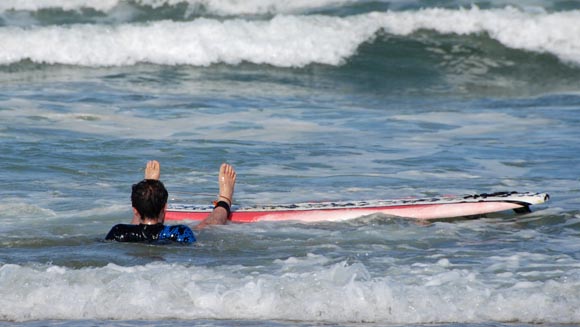
How can I IDDQD?
I spent the week after Gamescom on vacation, which is the reason I haven’t posted in a while. Last year, me and my Girlfriend decided that it would be cool to learn some recreational sport. We chose surfing. We went to a familiar camp at the French Atlantic coast and took a one-week course. It’s was the second day.
If Surfing was a computer game, it would have the most devastating learning curve. The first day went really well. The weather was perfect. The waves were moderate and tidy. We immediately learned how to take them lying on the surf board. We laughed and cheered all the way down to the shore. Not so much on the second day. The weather got more dramatic. The waves became larger and less predictable. The wind got stronger. But most importantly, we were trying to stand up. Suddenly, the whole activity became incredibly difficult. All of us constantly fell down. We rarely even managed to get out feet on the board. Every failure was incredibly punishing. Not only did you get hurled around in the wave and bruised by hitting the board and the ground. Afterwards, you also spent the next few minutes marching back out into the ocean, fighting one way after another until you were far away from the shore to have another try. And then you failed again. We all had our injuries. I strained my side real bad during a warm-up exercise. Nobody cheered on the second day.
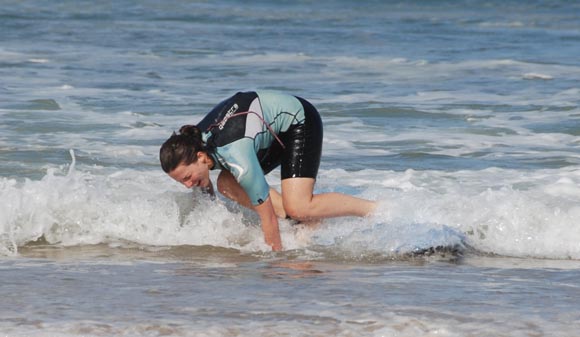
The first special move you learn is the “Faceplant”.
In fact, there were not too many cheers for the rest of the week. On the fourth day, we were free to practice on our own. I took two days off because I couldn’t even lie on the board anymore. I got back to practice eventually. But even those that managed to practice every day still weren’t able to stand up properly at the end of the week. And we are talking just about standing up, not even changing direction or anything.
It occurred to me that this is something we often criticize about computer games. Games like Demon’s Souls or Super Meat Boy. We often rage-quit games as soon as they throw even the slightest stumbling blocks at us. The argument being that they are somewhat inhumane or unreasonably punishing. We look at old arcade games and laugh about their un-forgiveness. “What? You have 5 lives and then you have start all over again? How crazy”. Yet, it takes just a week of any other, real-word activity to see how innocuous and easy they really are.
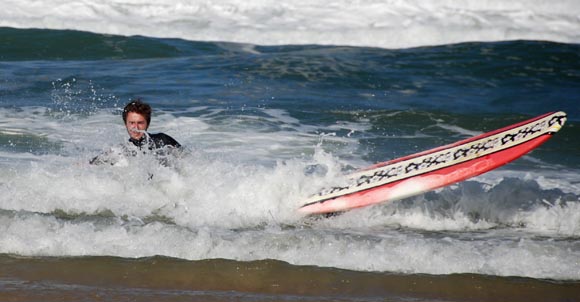
It’s disheartening to see inanimate objects being better at something than you are.
Games never punish you physically. They never exhaust you. There is rarely so much down-time between tries. You think that PSN takes ages to update? How about you compare that with dragging a surf board to the beach over that steep sand dune for 20 minutes every day?
Games offer plenty of tiny rewards and feedback to keep you trying. And they aren’t even asking for much. Learning to push the few button in the right sequence is trivial compared to the hundreds of hours you spend honing your sense of balance to simply not fall down from the various contraptions we humans came up with.
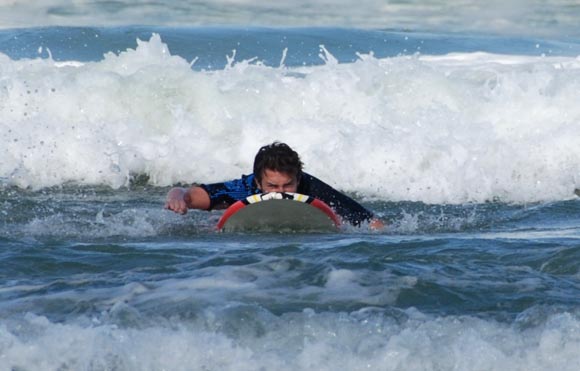
RAGE MODE!!!
The most surprising thing is perhaps how in spite of the disparity in difficulty, the actual rewards are not that far appart. Sure, an activity like surfing can be incredibly rewarding. The sense of thrill when you actually manage to ride a wave is undeniably exhilarating. But so is a close match in Street Fighter or a perfect round in Wipeout. Of course, it’s difficult to compare those experiences. They are certainly different. Nonetheless, I can’t shake the feeling that overall, the means to end ratio seems to be skewed dramatically in favor of digital entertainment.
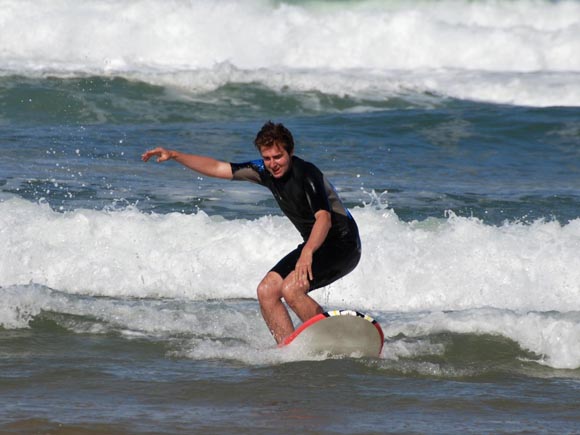
This success is only temporary. And I mean REALLY temporary. 1,5 seconds max.
That doesn’t mean that I wasn’t enjoying surfing. On the contrary. It was a welcome break from sitting at the computer. It felt great to get out in the sun again. You get plenty of exercise and you don’t even notice because you are distracted all the time. It’s pretty much what we were looking for and will definitely seek out more opportunities to practice in the future.
But it was also a great reminder of why games are so attractive in the first place. They unlock treasures, that must otherwise be bought with a lot more sweat, tears and time.






That was a really interesting blog post. I do sometimes get frustrated during difficult games but it’s true we completely separate that difficulty curve from real life.
Thanks for making me think.
-E
It’s things like this that make me wonder why I want to make games at all.
I think the physicality in sports is inherently giving constant feedback, maybe not always positive but definitely affirmative in a way. So, even in failures you get a sense of “progress”, or at least meaning, that keeps you going. And even pain is kind of a reward — or an antecedent for future rewards (growth). So I think the means to end ratio isn’t THAT bad in physical entertainment.
But maybe I’m just saying that because I no longer feel justified to spent the effort required to play games well. Yes, the obvious, shiny rewards can be earned more comfortably, but the effort-to-(real-life)-meaning ratio seems to be really bad in most digital games, which just makes me question the activity that much more often.
Speaking of which, I should rather question my meaningless web-surfing habit.
I think the feedback you get when doing sports varies a lot. Sure, sometimes it does feel great to push yourself to the limit. But when you injure yourself so much that you can’t do the sport anymore, that’s not really rewarding.
As for real-life-meaning: I’m skeptical about this as well. Watching the surfing teachers made me think about this as well. They were super-buff. But they invested EVERYTHING they had into this sport and were only moderately successful on a grander scale. The one rainy day gave a good impression of how they lives will look like once they get too old for this – they were bored to death and drank themselves into oblivion.
Well that’s true. Investing everything into an age-limited career isn’t that meaningful when you’re expired. But wouldn’t pro-gamers have that problem too? Granted, the usefulness of every specialized skill set depends on its context.
So I do have to clarify what context I had in mind, namely the benefits you’d get outside of the primary context of either activity. Specifically I’m thinking the health benefits that you get from sports even without committing your entire live to it. Though I guess you could attribute increased mental fitness to digital gaming, I just felt that I got less and less out of it that’s useful in other areas of my live.
But I do have the tendency to belittle what I have, so feel free to enlighten me
And yes, injuries are not rewarding, they’re the worst and nonconstructive feedback you can have.
Sports does lead to physical fitness. But fitness is something with extremely diminishing returns. Some fitness is obviously good. But to REALLY get buff or good at any given sport, you need to invest A LOT of time and effort. Also, fitness is extremely fleeting. Just a short break in your routine can undo months of work.
As for usefulness of Games – we have both observed that games literacy can significantly facilitate dealing with computer technology and software in general. And at least that’s something that doesn’t go away as quickly.
But thinking of activities as a means to something different is a dead-end in general. So what I’m talking about is the inherent value of an activity – how enjoyable and engaging it is to be doing it.